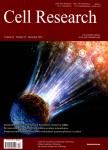Impaired reproduction in transgenic mice overexpressing γ-aminobutyric acid transporter Ⅰ (GAT1)
Impaired reproduction in transgenic mice overexpressing γ-aminobutyric acid transporter Ⅰ (GAT1)作者机构:Laboratory of Molecular Cell Biology Institute of Biochemistry and Cell Biology Shanghai Institutes for Biological Sciences Chinese Academy of Sciences Shanghai 200031 China.
出 版 物:《Cell Research》 (细胞研究(英文版))
年 卷 期:2004年第14卷第1期
页 面:54-59页
核心收录:
学科分类:0710[理学-生物学] 071010[理学-生物化学与分子生物学] 081704[工学-应用化学] 07[理学] 08[工学] 0817[工学-化学工程与技术]
基 金:国家重点基础研究发展计划(973计划)(G19990539)
主 题:GABA GAT1 testes sperm reproduction transgenic.
摘 要:It is well documented that γ-aminobutyric acid (GABA) system existed in reproductive organs. Recent researches showed that GABA_A and GABA_B receptors were present in testis and sperm, and might mediate the acrosome reaction induced by GABA and progesterone. GABA transporter Ⅰ (GAT1) also existed in testis and sperm, but its physiological function was unknown. In the present study, we used GAT1 overexpressing mice to explore GAT1 function in male reproductive system. We found that the expression level of GAT1 continuously increased in wild-type mouse testis from 1 month to 2 months after birth. GAT1 overexpression in mouse affected testis development, which embodied reduced testis mass and slowed spermatogenesis in transgenic mice. Moreover, transgenic mice showed increase of the percentage of broken sperm. The further study revealed that the reproductive capacity was impaired in GAT1 overexpressing mice. In addition, testosterone level was significantly low in transgenic mice compared with that in wi



